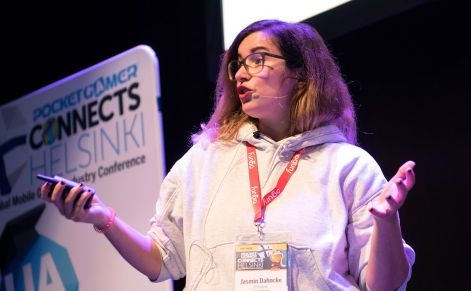A culture of collaboration: interview with Finland’s LGIN mentoring network | Pocket Gamer.biz

Mentorship can be extremely valuable in your professional development. Those new to running an indie game studio, in particular, can benefit from insight and advice from a more experienced industry inside.
The games industry (and the Finnish games industry in particular) is well known for its knowledge-sharing and networking, so it’s no surprise that mentors are a vital part of the ecosystem.
Suvi Kiviniemi works as a project specialist, building a network of studios and connecting them with mentors, at the Living Game Intelligence Network. LGIN is a game industry support community of startups and volunteering mentors and a part of Metropolia University of Applied Sciences in Helsinki.
“Metropolia has a campus incubation programme called Turbiini, and LGIN is a part of that. The programme is funded by Metropolia and the City of Helsinki,” explains Kiviniemi. Although located in Helsinki, its support is primarily online. The programme is free, and the Incubation Track it offers runs in three-month phases.
Currently, active mentors include Jasmin Dahncke, senior UX designer at Mainframe Industries; Jesse Ellonen, CEO at DieNo Games; Gregory Pellechi, Senior Narrative Designer at Action Squad Studios; Christopher Hamilton, Director of Developer Relations at Genvid; Aki Kanerva, founder of Virtual Air Guitar Company; and Ari Arnbjörnsson, Unreal Engine Evangelist at Epic Games.
LGIN is in the process of reaching a wider audience, running open events and engaging with game makers on social media. “We’re trying to be more visible in all the ways we can,” reveals Kiviniemi. So we took the opportunity to chat with them last month about what’s next for LGIN, the Finnish games industry, and how to get involved.
How does the university and LGIN support games industry start-ups?
First and foremost, LGIN is a mentoring and peer support network for game start-ups. On top of that, there’s an incubation programme that we call the Incubation Track. Everyone who is on the Track is also in the network, but not everybody who’s in the network is on the Track. Both the Incubation Track and the network are completely free for everybody. The Incubation Track is open for start-ups in the Helsinki area, and the network is open for teams in Finland everywhere.
There are quite a few mentors by now, perhaps 30 to 40, who volunteer to help the teams. There are now close to 30 teams already. And on the Incubation Track itself, there are nine teams at the moment. We have a very active online community where people help each other out and ask questions, discuss how the industry’s going and development advice, and share future predictions. And, of course, also we post silly pictures and recommend games!
We have events for people in the network. Roughly once a month, we also have an open-for-all online event that anybody from all around the world can join. We do it online to make it easy for people to join, even from Northern Finland, because we are in Helsinki, and we don’t want to leave anybody out of the network.
One of my favourite internal events for the network is the game design workshop, where one team brings its game that’s playable but nowhere close to ready. And then somebody plays it on a stream, and everybody else can comment and ask questions, and we give feedback about the game. It’s really fun and very, very helpful for the team to actually get feedback. Oftentimes, there’s a handful of very serious game designers commenting on the games, so they get really valuable feedback on what they are doing.
When did the LGIN get started?
I started in game incubation five-and-a-half years ago. But that wasn’t LGIN yet. It was an EU project where we explored how game incubation could work. I was a games entrepreneur myself before that, but I had no clue then how game incubation worked exactly [laughs], so we tried three batches.
The funding was pretty tight. We needed to figure out something that could run with smaller resources. We started the network of LGIN – just the network, without the Incubation Track. My thinking when I was designing LGIN was that the Finnish games industry has a community here. People do help each other.
The main role of a mentor is not to give answers; it’s to ask good questions so that people can find their own path to success
Suvi Kiviniemi, LGIN
And that’s not accidental. It doesn’t come from nothing. We need to take care of it, especially as the industry becomes more mature. I wanted to build something that both helps the start-ups, of course, but also puts the community and the helpful culture front and centre. So that was my thinking, and that’s what LGIN is all about.
What are some of the key challenges facing games companies today, particularly in Finland?
Most of the teams that I work with are first-timers. This is their first start-up. The challenges would be slightly different if they were more experienced people. But the core challenge for any games company is to find a good game. And that’s not easy! We know how many games Supercell has killed. Even if you are more experienced, it’s not always obvious what game you should be making. That is the biggest challenge.
Our pool of mentors and peers definitely can help give teams feedback and give them tools about how to figure it out and how to approach the whole topic of actually making a good game.
Meanwhile, if we were to ask that question of the teams, many would say, “We lack funding.” In Finland, you need to raise tens of thousands of pounds to then be eligible to get Business Finland money. And that can be really hard for teams. Of course, we can help people grow and figure things out: what do they need to do to get there, to get to the point where investors will be interested?
What qualities does a person need to be a good mentor?
Mainly, a mentor needs to be able to listen and know how to ask good questions. Nobody knows how to make a good game and how to run a business for certain. Of course, there’s good advice that people can give, but the main role of a mentor is not, in my opinion, to give answers; it’s to ask good questions so that people can find their own path to success.
I’m more capable of advising on the business side. I’m not a designer. I’m a business-side person. But luckily, I’m not doing this alone. All the respect goes to the mentors and the pool of people we have around us.
What’s in it for a mentor?
The most important answer is that it’s fun! People just simply like helping each other. It’s really good to be able to help others.
But of course, people also learn from teaching. When you mentor somebody, you learn things yourself.
It’s also great for networking with the teams and with the other mentors, too. You can build a personal brand by being a mentor.
What makes the Finnish games industry unique?
Finland is such a small country that it doesn’t feel like we are competing with each other. We are competing against the world.
There are a couple of stories about how it became what it became! The demoscene is definitely one of the big reasons. That’s where the culture originally started. People were doing cool stuff together. They were in gentle, fun competition and trying out who can do the coolest things. To this day, those people are often on the most senior ladder of the industry.
And the presence of Nokia was another reason. At one time, Nokia was the main customer for mobile games. Companies were able to sell projects directly to Nokia. And there were only a handful of companies, so they collaborated and they asked questions. They discussed what should be done for Nokia.
One of my favourite events is the game design workshop, where one team brings its game and everybody can comment and ask questions, and give feedback
Suvi Kiviniemi, LGIN
And since then, we have all taken care of [the culture], and people have made a conscious effort to make it stay this way.
What advice do you have for a new games company? What’s the first thing a new entrepreneur should do in this business?
They should talk to everybody. That’s the first thing they should do! They should ask good questions.
I wouldn’t advise you to blindly obey anybody, though. Find your own path based on what you learn when you talk to everybody. That’s maybe the most important thing.
What are your big goals for evolving LGIN in the year ahead?
This year, we started to record events, and we will post them on YouTube. We’ve been organising more open-for-all events and recording those.
Another development I’m working on for LGIN at the moment is that at the beginning of the Incubation Track, there’s a game business course that I teach. It’s a more traditional course, but it’s a kickstart for people to understand the game business because many people who come to the Track don’t. I have been developing this course quite heavily. So that’s been taking quite a lot of time. It’s always been based on actual data, but I’ve been researching information to make it even better.
We’ll be heading to Finland in September for this year’s essential conference, PGC Helsinki 2023. In the meantime, if you want to become a mentor for the LGIN teams, you can contact Suvi Kiviniemi.





